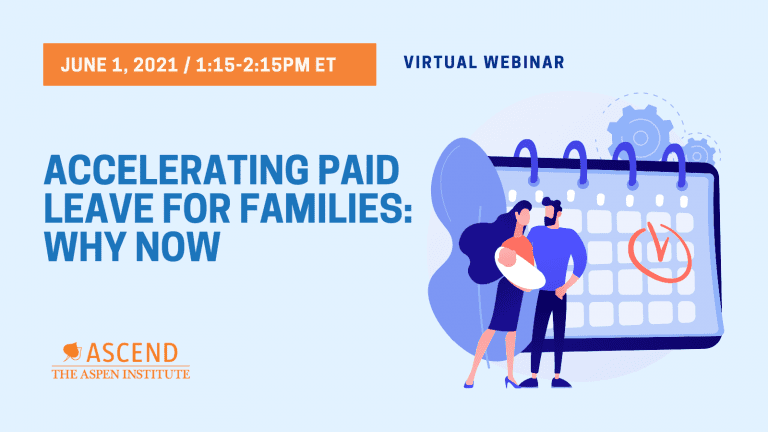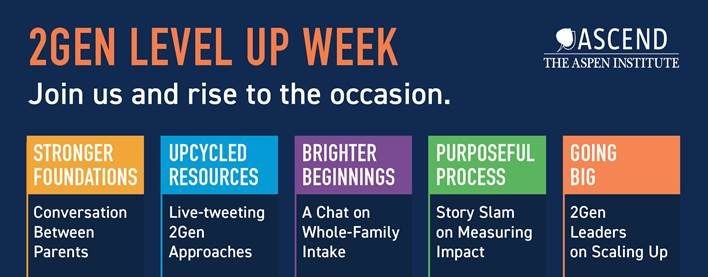WEBINAR: Parent Voice During COVID-19: Maintaining Feedback Loops
As the hub for breakthrough ideas and collaborations that move children and their parents toward educational success and economic security, Ascend is intensifying its efforts in the midst of the coronavirus pandemic to highlight 2Gen solutions that Ascend Fellows and the Ascend Network have developed over the past decade to help families reach their potential. Ascend is examining how new solutions, anchored in a 2Gen approach, can build and improve long-term outcomes that stabilize the health, economic well-being, and education of families as they recover and move forward from the COVID-19 crisis.
In a series of webinars, Ascend will tap the insights, expertise, and resources of the Ascend Network, Ascend Fellows, parents, and policy partners to offer solutions for how best to assist families now and ensure they have a stronger, more equitable future. Read on to learn about the Implications and Useful Lessons around Child Support webinar, and visit this page to learn more about the series.
Parent Voice During COVID-19: Maintaining Feedback Loops
Parents and families are experts in their own lives and they are best positioned to give insight on their needs and challenges, as well as provide feedback to policymakers and service providers. Their voice is even more critical now as we are responding to the ever changing environment caused by the current pandemic. During this webinar, we will discuss ways to maintain and strengthen feedback loops that keep parent voice at the forefront of policy discussions and service delivery practices in this new world of social distancing and virtual programming.
The webinar recording can be found here, and the presentation slides can be accessed here.
Speakers:
- Betsy Delgado, Ascend Fellow and Vice President of Mission and Education Initiatives, Goodwill of Central and Southern Indiana
- Katie Reigelsperger, Parent, Goodwill of Central and Southern Indiana
- Melvette Hill, Policy and Partnership Consultant, National Parent Leadership Institute
- Yukiyo Iida, Parent, National Parent Leadership Institute
- Fran Sykes, President, Pascale Sykes Foundation
- Heather and Ken Crotty, Parents, United Advocacy Group
The webinar was moderated by Sarah Haight, associate director for network and outreach at Ascend at the Aspen Institute, and Eddy Encinales, program associate at Ascend at the Aspen Institute.
During the discussion, the participants highlighted best practices for maintaining and strengthening feedback loops with parents and families in this unprecedented moment, including the following:
- Prioritize regular check-ins with parents to keep them as up-to-date as possible and determine how to adapt programming to meet their changing circumstances and needs. Operated by Goodwill of Central and Southern Indiana, The Excel Center is a tuition free, public charter high school for adults that helps remove barriers to education by offering support services such as on-site child care, transportation assistance, and college credit courses. At the start of the pandemic, The Excel Center staff focused on keeping parents informed of schedule changes as they transitioned to online learning. The Excel Center administered an online survey to gather information about students’ work schedules and shifting work responsibilities, find out how COVID-19 was impacting their daily lives, and identify single-parent households that may need additional support. Faculty then used this information to help students adjust their schedules as needed to meet other commitments (such as caring for children who are now at home during the day or shifting their work schedule to evening hours). Faculty now offer one-on-one Zoom sessions to students unable to participate in group lectures.
- Communicate with parents through channels they are most comfortable with. The Excel Center determined a group Facebook page is the most effective way to reach out to and connect with students who share a class together. Staff members are also using Zoom and social media to share updates and keep in touch with students.
“To maintain our connection with students, we had to maintain our coaching model,” explained Betsy Delgado, an Ascend Fellow and Vice President of Mission and Education Initiatives, Goodwill of Central and Southern Indiana. “We are making over 30,000 connections a week using everything from phone calls to Google forms, working with each family in whatever form works best for them.” - Prioritize building relationships with families. According to Delgado, The Excel School’s commitment to building trusting relationships with families has helped ease the transition to virtual learning and allowed the program to keep feedback loops with parents open. Other panelists also highlighted the importance of being able to lean into existing relationships when a crisis occurs.
- Ensure families have the ability to stay connected. When the crisis began, service providers and funders scrambled to help families stay connected by ensuring they had access to cell phones, computers, and high speed Internet. The Excel Center set up a daily Zoom meeting with community leaders to find out what they needed to maintain strong connections with and among families. The Pascale Sykes Foundation, which is focused on helping working families stabilize themselves and achieve their dreams, called an emergency board meeting to get permission to provide funds to meet the immediate needs of families and ensure they were able to keep in touch. Much of that funding went to provide equipment and software—and pay utility bills—to ensure connectivity.
- Get as close to face-to-face as possible. Programs like Zoom and FaceTime create a stronger connection by allowing participants to see each other and read body language and facial expressions that might not be conveyed through an email, text, or phone call.
- Maintain consistent supports for families. The National Parent Leadership Institute (NPLI) helps parents build the skills they need to become advocates for children while working to increase racial equity in policy and practice throughout their communities and across their states. To keep parents engaged during the pandemic, NPLI has focused on providing consistent supports to families, such as delivering meal cards to families who relied on NPLI for a daily meal and continuing to drop of children’s books to families as they had before the crisis.
“My husband and I have had to become many things—teachers, therapists, counselors—in addition to parents,” explained Heather Crotty, who, with her husband Ken, is working to help their 11-year-old son meet his academic and social needs while completing his school year online. The Crotty family worked with a coach from United Advocacy Group to establish a plan for continuing to access services they were getting through the school, including working virtually to maintain their son’s IEP and plan for a successful transition to middle school in the Fall. - Empower parents as change agents. As NPLI continues to keep families at the center of its work during the pandemic, it is preparing parents to step out in their communities to advocate for the policies families need. With coaching from NPLI, parents are challenging policies at the local, state, and federal level and telling leaders how they are doing and what they need. This includes offering up their opinions on how schools should operate moving forward and having a say in what the new school year will look like next Fall.
Participants also responded to the following questions.
How are you connecting with other parents right now? Are there lessons in the tools you use?
Katie Reigelsperger: As an instructor and a parent, I am constantly encouraging parents in my class to reach out to other students who are also parents. Many of these students communicate with each other through the Facebook group chat, which gives them a platform to talk about how they are dealing with things outside of and in addition to their class work.
It is important to pay parents for the time and expertise they provide when offering counsel. Community colleges are limited in their ability to compensate student parents without impacting their student aid package. How can this be addressed?
Melvette Hill: Through our 2Gen advisory council, we wrote into legislation that parents would be compensated for their time. We didn’t have funding to do that, but wanted it to be known that it had to be done. We then partnered with various philanthropic groups who provided funding to compensate parent leaders for their time. [In response to parent requests] we award parents with a Visa gift card, which makes it an in-kind reward rather than cash payment.
What is your advice for coaches who are having a hard time connecting with parents during Covid-19?
Katie Reigelsperger: Social media is huge – plus Zoom and Google classroom. When trying to get through to people, it is important to ask them how to make it easier to connect. We need to let people know we are all going through the same thing and understand how they feel right now may make it easier to connect with people.
Betsy Delgado: A lot of research out there that says if you already have the relationship it is easier to move to the virtual world. It is much harder to build a new relationship in this environment, which makes connecting face-to-face, via Zoom or Facetime so important. Communicating often but in small doses is also important. Most families prefer to connect via a series of short, five-minute check-ins rather than being required to sit on an hour-long call.
Fran Sykes: Even families without Internet usually have a cell. Send them a text and they will eventually respond.
Community Colleges are limited in their ability to compensate student parents for their expertise/time because anything we provide to them will counts as financial aid and toward their maximum award limit based on Cost of Attendance formulas. Are there any ideas to get around this or partner to provide the compensation?
Melvette Hill: Some organizations use gift cards to pay parents, for example using a VISA Gift Card. Also, when purchasing these type of gift cards from local banks, you can negotiate with them to waive the fees. Additionally, we have partnered with philanthropic organizations in the state to provide funding for stipends for the parents –again these can be in the form of gift cards. As a community college are you able to waive fees, I.e. registration for parents as a way to ‘compensate’ them? Also consider gift certificate to school book store – they can use to purchase books?
For families anticipating summer school, how can parents prepare for instruction/comprehension/completion as well as personal development opportunities? How do parents return to work if child care centers are closed?
Fran Sykes: Our grantees offer tutoring for children and caregivers. Day care centers are opening, but most summer camps are cancelled or virtual so supervision remains a problem. Handling this is a work in progress. When parents have Internet access, Zoom calls may be more equitable than in-person meetings.
Have you seen interest from parents in moving to a virtual platform even when they are able to meet again in-person?
Fran Sykes: Prior to March, some of our classes required homework to be completed and submitted using cell phones. I envision returning to in-person classes to create discourse and build social capital, but think classwork will be even more available on-line and homework will be submitted electronically. Virtual staff meetings seem to have better attendance than in-person ones. My guess is that in the future, meetings will see a mix of in-person and virtual participation.
Yukiyo Iida: Many school events for parents were only available as in-person events, and many parents voiced that they were unable to attend because they could not secure child care, or they worked evenings. The shift to virtual meetings enables more parents to participate from home. Continuing to allow virtual access to events, even when we return to more in-person meetings, will create more equitable access to information.
Melvette Hill: Prior to COVID-19, we were using Zoom to meet with parents, but now we will consider using Zoom as a tool for larger formal meetings so that parents can participate without having to be in person.
Were there any digital literacy barriers, and, if so, how were these addressed?
Melvette Hill: When we hosted our Parent Leadership Training Institute sessions virtually, we sent out instructions as well as links to Zoom tutorials in advance. In some instances, we hosted practice Zoom sessions to help parents become familiar with the platform and its features.
Fran Sykes: Staff who wanted to rely on cell phones rather than Zoom needed some coaching. Some families share one computer among three or four people, so rely more on using cell phones.
Many parents say they are tired of being on-line or it is a challenge to participate while they have their kids with them. Any tips for making Zoom and other video conferencing easier?
Fran Sykes: Everyone is tired of spending time at home. We initially found virtual participation in some activities, such as ESL classes, reached more family members because all adults were home. Now that warm weather is here, families want to get outside and restrictions are loosening up. The situation is changing and we must creatively modify ways to stay connected to our families. One way is to include whole families in the video conferencing through family projects and games, so the entire family can work on the same goals together.
Melvette Hill: People are becoming overwhelmed with having to constantly be connected to and with digital spaces. One way to keep parents/families engaged in this virtual meeting environment is to give them an opportunity to lead part of the meeting by assigning them an agenda item. Also, poll parents to determine what day of the week and time of day works best for their family. This may change from one season to the next, so you may need to survey them every few months.
To elevate its work focused on parent engagement, Ascend developed a set of principles for our work with parents. These principles will ensure that Ascend’s parent engagement efforts are intentional and follow guidelines to guarantee that parents are respected, and their expertise is honored and highlighted appropriately.
During the webinar, Eddy Encinales shared a draft of these principles, which were informed by the voices of parents through the feedback the Ascend team has gathered during our years of partnering with families. Ascend is working with its Network to revise these principles and plans to release a toolkit later this summer to help groups appropriately engage with parents. Those interested in providing input to the toolkit should contact Eddy Encinales at eddy.encinales@aspeninstitute.org.
Related Posts















